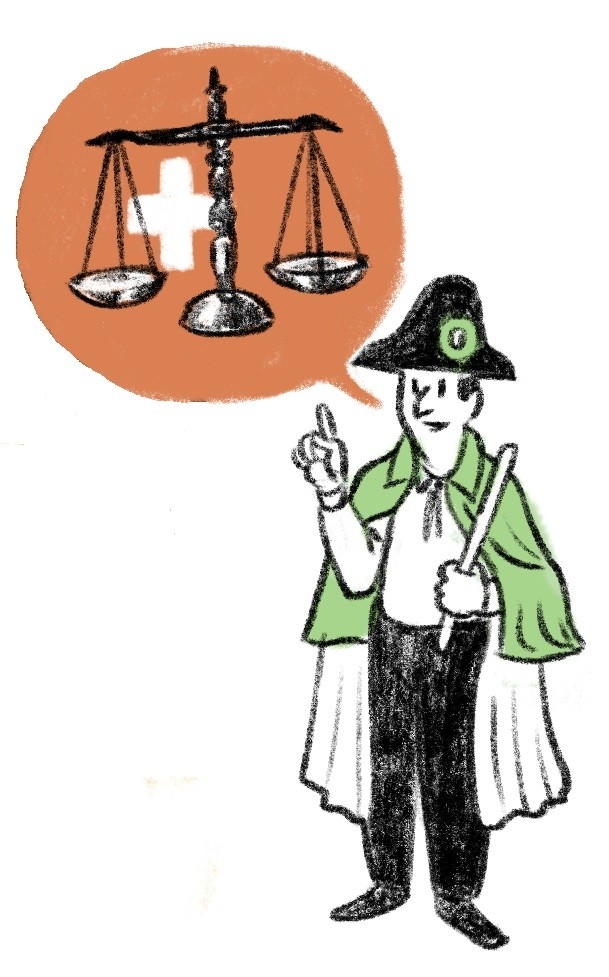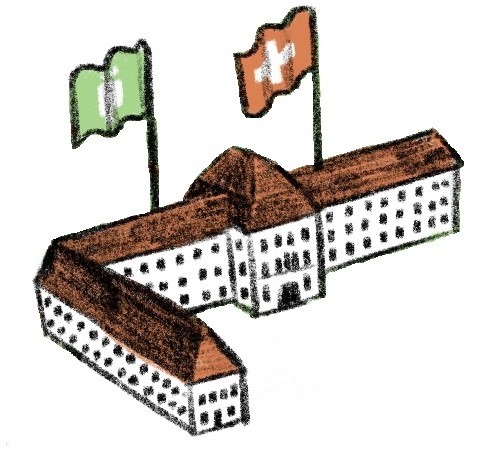Political system
Switzerland is a federalist state. This means that power is distributed over 3 levels of government. There is the Confederation, the cantons and the communes. Each level of government has its own task.
Direct democracy enables the population to have a say in decisions at all political levels.
Switzerland is governed by the Bundesrat . That's 7 members of different parties.
Federal Bundesrätinnen und Bundesräte are elected by the Bundesversammlung . This consists of a large and a small chamber.
The Grand Chamber is the Nationalrat , which represents the people. The small chamber is the Ständerat , which is responsible for representing the cantons.
In the canton of St.Gallen, there are at the cantonal level:
- the St.Galler Kantonsregierung with 7 members new window
- the St.Galler Kantonsrat with 120 members new window

The St.Gallen Cantonal Council
The St.Gallen Cantonal Council - an explanatory film of the Canton of St.Gallen
The separation of powers
Power within the 3 levels of government is divided among 3 state authorities (so-called separation of powers): the parliament (legislative), the government (executive) and the courts (judiciary). These have the following tasks:
- Parliament makes and changes the laws.
- The government carries out the laws.
- The courts decide whether the laws are properly applied.
The separation of powers ensures a better distribution and control of power.
At the federal level, there is the parliament, consisting of the Nationalrat Council and the Council Ständerat (legislative), the Bundesrat (executive) and the Bundesgerichte (judiciary).

In the Canton of St.Gallen, these 3 powers are:
- St.Galler Kantonsrat (legislative)
- St.Galler Kantonsregierung (Executive)
- Kantonsgerichte (Judiciary)
Federalism
Switzerland has a federal structure. The Confederation, the 26 cantons and the almost 3000 municipalities share the tasks of the state.
The Confederation is solely responsible for those areas that are explicitly entrusted to it by the Federal Constitution, such as foreign policy, economic and monetary policy.
The cantons have a great deal of autonomy. They carry out tasks such as the organisation of education, construction, health care and the police.
The smallest political unit in Switzerland is the municipality. The municipalities are responsible for tasks such as garbage collection, the construction and maintenance of local roads, water and natural gas supply, sports and leisure facilities.
Participation of the population
In Switzerland, the political participation of the people is very important.
From the age of 18, all persons with Swiss citizenship who live in Switzerland can participate in federal, cantonal and municipal votes and vote at the ballot box. Under these conditions, they can also launch a popular initiative, hold a referendum and sign both.
The national representatives are elected by the people. The cantonal and municipal governments are also elected by the people.
Video by SWI swissinfo.ch new window
Foreigners cannot vote or vote in elections at the federal level. They only have the right to vote at cantonal and municipal level. Foreigners cannot vote in the Canton of St.Gallen.
Petition
All persons – including foreigners – have the right to petition authorities at municipal, cantonal and federal level. Petitions may contain suggestions, complaints, or requests.
